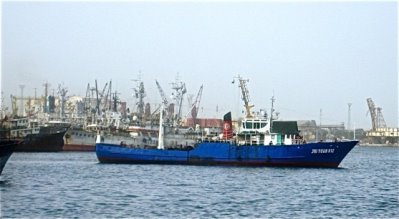 The major organisations of small-scale fishers in Senegal, men, women, of all professions along the artisanal value chains are up in arms in the face of further threats to their livelihoods and future. What happens? Fisheries landings are going down since the turn of the millennium, mostly as a result of overfishing by industrial fleets. Those flying the Senegalese flag are often in foreign ownership or joint ventures oriented to export. The Minister for Fisheries and the Maritime Economy apparently wants to grant 56 more licences to primarily Chinese industrial vessels or boats to be "Senegalised".
The major organisations of small-scale fishers in Senegal, men, women, of all professions along the artisanal value chains are up in arms in the face of further threats to their livelihoods and future. What happens? Fisheries landings are going down since the turn of the millennium, mostly as a result of overfishing by industrial fleets. Those flying the Senegalese flag are often in foreign ownership or joint ventures oriented to export. The Minister for Fisheries and the Maritime Economy apparently wants to grant 56 more licences to primarily Chinese industrial vessels or boats to be "Senegalised".
This is posing a direct threat to the hundreds of thousands of small-scale fishers, particularly the women in the pre- and post-harvest sectors who are already suffering from declining profitability as a result of the often illegitimate competition from highly subsidised industrial vessels. This is well documented through national and international research results.
 The move of the Minister is all the more surprising as the Government has discontinued the issuance of licences for coastal bottom fishing by Order No. 5166 of August 08, 2006. It has extended the freeze on the registration of new artisanal pirogues by Order No. 6397 of August 29, 2012 with the explicit justification of reigning in excessive fishing effort and capacity.
The move of the Minister is all the more surprising as the Government has discontinued the issuance of licences for coastal bottom fishing by Order No. 5166 of August 08, 2006. It has extended the freeze on the registration of new artisanal pirogues by Order No. 6397 of August 29, 2012 with the explicit justification of reigning in excessive fishing effort and capacity.
The professional organisations of the artisanal fishers in Senegal are asking for establishing transparency as required by the existing rules and regulations and urge to stop any further industrial licences irrespective of which flag the vessel is flying.
Mundus maris, in line with its long-term support to sustainable and prosperous small-scale fisheries in Senegal and elsewhere, expresses its solidarity with the demands of the professional organisations. It asks for measures to recover the resources degraded from overfishing aggravated by climate change. Implementing the FAO Guidelines for securing sustainable small-scale fisheries in combination with such recovery measures could be facilitated by the Small-Scale Fisheries Academy, a space for practising joint learning and seeking robust solutions in an atmosphere of mutual respect and free exchange.
Read the press release here.








